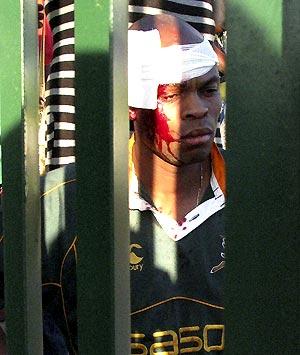
At least 14 people were injured as mostly ticketless Nigerian fans attempted to push their way into the Makhulong Stadium, in Tembisa on the outskirts of Johannesburg, to watch their country play a World Cup warm-up against North Korea.
Organisation and security for the match, put together by the Nigerian Football Federation, proved insufficient as fans broke down a gate, seriously injuring a policeman.
The spectre of supporters attempting to force their way into stadiums for major matches is a regular occurrence in African football, often with deadly consequences.
Just over a year ago 19 people were killed and more than 100 injured trying to stampede into a World Cup qualifier between the Ivory Coast and Malawi in Abidjan.
World Cup qualifiers around Africa, where security procedures are haphazardly imposed, have had a deadly toll over the last decade with people crushed to death in Guinea, Liberia, Nigeria, Togo, Zambia and Zimbabwe.
In Tembisa spectators were able to force their way right up to the main gate, in contrast with a large security perimeter thrown around World Cup venues for the tournament starting on Friday.
Elaborate checks are to in place to ensure an incident free tournament, with spectators forced to go through several rings of security before taking up their seats.
"It seems that again the elite professional game in corporate stadiums receive all the funding and meticulous attention while the grassroots venues do not," said American-based African football history academic Peter Alegi, author of a recent book on the African game.
"There is not much chance there will be any rub off effect after the World Cup on ensuring better security at normal matches around Africa," he told Reuters in a telephone interview.
Many African officials will form part of FIFA's organisational contingent at the World Cup in South Africa and return home with an understanding of proper match security practices, only to find the resources need to implement them in their own countries is not available.
Material like security railings, fencing, even transportation for policemen to attend the event are difficult to find. A lack of training for security personnel is another problem.
Even if FIFA and the 2010 World Cup bring new standards in spectator comfort to the African game, the reality of the continent's paucity of resources, and the rabid passion of fans, will continue to make watching the game a perilous activity.